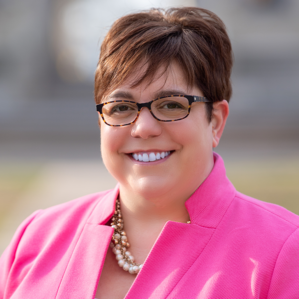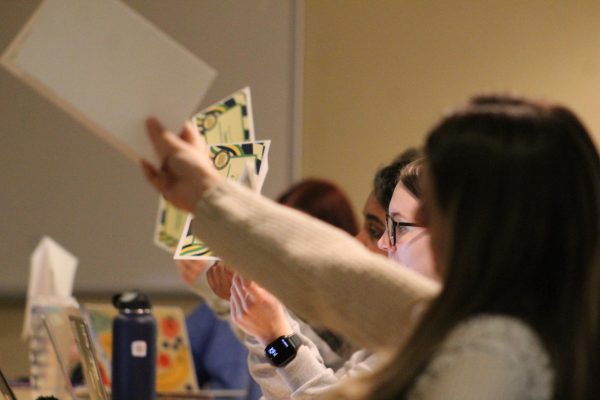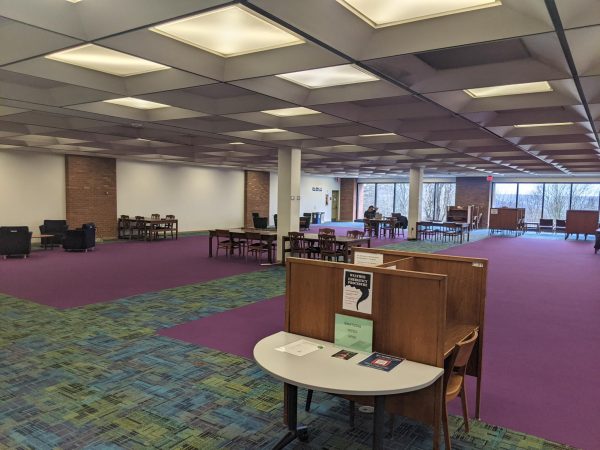Women’s March on Washington follow-up encourages ongoing conversation
Almost a month has passed since the historic Women’s March occurred in the United States and across the world. Hundreds of thousands of people took to the streets to advocate for a progression of women’s rights, social justice reform and a plethora of other issues.
Julia Ludewig, assistant professor of modern and classical languages, organized an event at the Tippie Alumni Center on Wednesday, Feb. 15. Ludewig, who attended the march in the District of Columbia with other Allegheny students, faculty and staff, said those who participated in the march wanted to ensure that its ideals continued when they returned to campus.
“On our way back, we thought of ways to channel that energy that we really felt while we were there into something that lasts longer, into something that turns into sustainable political engagement on campus,” Ludewig said.
Since her return from the march, Ludewig has collaborated with other staff members to organize a campus discussion. In order to foster this discussion, the event was consisted of a panel of participants and break-out group sessions.
The event began with each member of the panel—which consisted of three faculty members, three students, and Meadville Community Member Peter Zimmer—introducing themselves. Following the introductions and presentations by the panelists, those in attendance participated in a conversation on numerous topics, including women and minority rights, protests and education.
For the remainder of the forum, those in attendance divided into break-out groups, each discussing a different topic from the women’s march in order to facilitate more in-depth level of discussion.
One of the groups was lead by Andrew Goodman Foundation Ambassadors Yemi Olaiya, ’17, and Maria Pineda, ’17, and focused on how student organizations can aid each other in their efforts to make a difference in the community.
Jesse Tomkiewicz, ’20, and Madeline Hernstrom-Hill, ’18, from College Democrats, led a sub-panel on improving connection to local public efforts, and understanding the Meadville community’s issues.
Ludewig said sustainability of discussion on social matters was one of the main goals of the forum, and equally as important was trying to emphasize how crucial it is for people to have exposure to social issues.
“The general framework is the idea of giving people a forum to develop ideas and strategies of political engagement on campus and beyond campus,” Ludewig said.
Ludewig and other organizers said they hope to give those on campus “psychological empowerment,” which would entail giving them the feeling that they can make a difference in social injustice by making their voices heard.
Steve Prince, an assistant professor of art and artist-in-residence, said we need to “start in our own back yard” and address the issues put directly in front of us before a larger change can be made.
Tomkiewicz, who was also one of the panelists, said he hopes the forum would serve as a catalyst for more progressive action in the community.
“What I want to see is us going forward, taking this energy and putting it into action,” Tomkiewicz said.
For long-term action on the community level, Andrew Bloeser, assistant professor of political science and faculty panelist, stressed the importance of different groups understanding each other’s differences, yet coming together to find “common ground.”
“[The] path to common ground basically involves finding out ways to make concrete changes in people’s lives,” Bloeser said.
He said that because everyone has different factors in life that present challenges to them, we all can understand injustice and in understanding it, we can come together for societal progress.
Akeem Adesiji, ’20, said he believes continuing the energy from the Women’s March on Washington is important for addressing concerning issues in society today.
“The women’s march was a huge event which addressed many concerns of great importance. This forum serves as an example of how that energy can become action on our campus and other small communities,” Adesiji said.
In terms of the Meadville community, Tomkiewicz commented during discussion it could serve as a catalyst for a “bottom up approach” on dealing with social issues.
Ludewig said the next step is to continue fostering discussion at Allegheny College, and she hopes this event will inspire others to hold similar ones.








